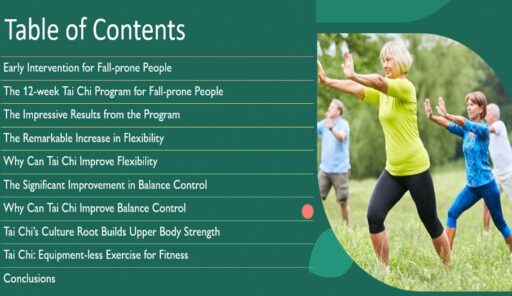Falls are a leading cause of accidental death in older adults, with postmenopausal women particularly at risk due to osteoporosis.
Tai Chi as a Solution
A study published in June 2024 investigated the effects of a 12-week Tai Chi program on balance control and functional fitness in postmenopausal women aged 60-70 who self-identified as fall-prone.
Study Design
- Participants: 50 women (24 in the Tai Chi group, 26 in the control group).
- Intervention: The Tai Chi group engaged in supervised Tai Chi sessions thrice weekly for 12 weeks.
- Sessions included a 10-minute warm-up, gradually increasing Tai Chi practice, and a 10-minute cool-down.
- Control Group: No structured physical activity, only allowed walking.

A tutorial with details is available for ATCQA Members and Certified Instructors/Practitioners.
Results
After 12 weeks, the Tai Chi group showed significant improvements:
- Flexibility: Increased by 163.2%.
- Sit-and-Reach Test: Improvement from 3.8 cm to 10.0 cm.
- Balance: Improved by 61.0%.
- One-Leg Stand Test: Duration increased by 2.5 seconds.
- Upper-Body Strength: Enhanced by 8.3%.
- Handgrip Strength: Exceeded national norms for their age group.
Tai Chi’s Broader Benefits
Tai Chi’s low-intensity, equipment-free exercise is ideal for older adults, helping to break the cycle of falling, fear, and inactivity. It promotes long-term exercise participation and adherence, crucial for improving quality of life and reducing fall-related risks.
Conclusion
Tai Chi is a valuable intervention for older women at risk of falling, offering significant improvements in flexibility, balance, and functional fitness. Its safety and effectiveness make it a beneficial addition to the exercise routines of fall-prone individuals, enhancing their independence and overall well-being.